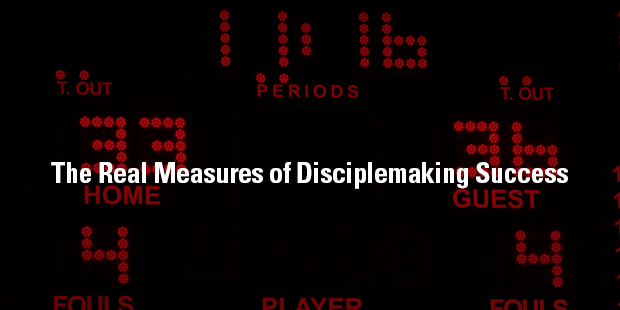
The Real Measures of Disciplemaking Success
Every pastor worth their seminary degree will tell you when asked, that real success in their church cannot be found in more people, more money, or more buildings. But, nobody really ever asks that question. As a result, the only measure of Great Commission success most pastors can enumerate has nothing to do with actual disciple-making.
Here is why: We’ve been trained to feel good when more people show up this month than last month, and to panic some when they don’t. We’ve learned to lead strong when people give at least as much, if not more, as they did last year. We lead even stronger when giving is down year-over-year. It stands to reason though that a church can make a budget without making any new disciples, and a pastor can fill a room without filling anyone spiritually. Classic examples of both exist in our modern church culture.
How then, can a leader be sure that the work they have given their life-to is producing the fruit that Jesus gave His life-for? It requires a new success scoreboard.
A new scoreboard must exist in which the points scored are known as disciples made. Stewardship and programmatic engagement must still be measured, but only serve as information for the team… not victory in the effort. After all, a basketball team has never won by committing fewer fouls or retaining more time-outs at the end of the game. They win by scoring the most points. It should be noted though, that a team can lose the game by losing track of how many fouls they have left to give or time-outs they have left to call – Chris Webber anyone? In this way, giving and attendance should be measured, but not measured as success in a genuinely missional call. A team wins by scoring more points than their opposition. And churches can only put points on the scoreboard by making disciples from out of our culture and from out of our cultural Christianity.
At Auxano, the consulting work we do centers around the crafting of this new success scoreboard. Our team of Navigators helps church teams build a visual, verbal indicator of success through disciple-making. Pastors and staff leaders thrive as they are growing people to maturity, not as they are convincing people to give to another building (they aren’t sure you need) or to show up to another event (they aren’t sure they need). Knowing when we are successful takes a shared set of disciple-defining measures. Will Mancini calls them Missional Marks in his book Church Unique, and here are eight reasons to retool your success scoreboard.
- Each growing believer will strive toward a Biblical picture of maturity that is highly individualized and likely random.
- Knowing more about Jesus can be misconstrued as growing more in Jesus.
- Leaders can only hope that people are making a healthy application to their lives from sermons or Bible studies
- The celebrations that inform and shape culture cannot take place because celebration requires a shared language of success.
- People get the feeling they are there to grow a program, rather than know that the programs are there to help them grow.
- Small group leaders struggle to make consistent connections between the lessons each and every week.
- Elders can only provide conversational, marketplace wisdom for simple decisions, rather than leverage their experience to strategize Kingdom-level transformation.
- Family ministry becomes a series of connected events across age groups, led from an org chart position, rather than a spiritual continuum of maturity across every age, leading toward family discipleship.

Tags: Bryan Rose, Disciplemaking, Disciplemaking success, Scoreboard












